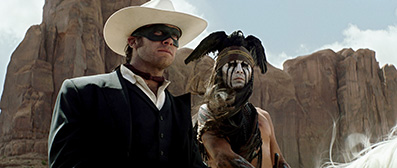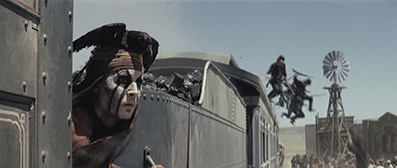"But even before talking to Hans I had been designing this finale and trying
to hold it back, hold back the William Tell, because it's so... I mean it's in
Huggies commercials and god knows what. It's the most overplayed tune,
so trying to hold it back until the finale... We tease it, but then we hold it." |
Director, Gore Verbinski commenting on his composer's lack of
enthusiasm for one of Rossini's finest and best known pieces. |
I am a child of the sixties which means I must have seen episodes of the two 1950s Lone Ranger TV shows, one imported from the US, one homegrown. The famous finale of the William Tell Overture (you know the one, "duddle-un, duddle-un, duddle-un dun dun etc."), was so connected to both shows - having originated on the radio - it was almost like one could not exist without the other despite the music having been written in 1829. In this huge Hollywood version of the famous radio and TV drama, the director is smart enough to tease the theme but not let us have its full and resounding presence until the extraordinary finale. It was at that moment Verbinski's film not only came alive but dropped a cog, pulled back the stick and soared superbly for twenty fantasy stuffed minutes. All the things I dislike about modern big spectacle movies were here in spades but there were two aspects of it that instead of making me hate it, made me adore it (just the last twenty minutes you understand). That's my signpost. The revelation of those aspects is coming to a paragraph near you very soon. First a recap to those unfamiliar with the masked man and his native American friend.

A bad guy (you can tell from the lip scar) is on a steam train being delivered to be hanged. Shackled next to him is a strange fellow with a dead crow on his head, a dead crow, it should be said, that he insists on feeding. This is Tonto, the fruit-loop Comanche Indian. Enter the principal lawman's brother who's a stickler for the letter of the law who stops Tonto from killing the bad guy. The bad guy escapes and so begins the relationship of one of the oddest crime-fighting duo in crime fiction history. I have to share the joke that first made me aware that different races, creeds and colours all take great stock in their own identities. As 'tribes', we insist in being apart from others instead of seeing us all equal at a molecular level (yeah, I know. I was an odd child). In my youth, the cowboys were generally regarded as the good guys and the Indians, the bad (oh, history, you bad, misrepresenting boy). So The Lone Ranger and Tonto are suddenly surrounded by a huge group of very angry Indians. The Lone Ranger says "Well, Tonto, we're in trouble now..." to which Tonto replies "What do you mean 'we'?" – a joke I still smile at.
Actor Mark Wahlberg asked rhetorically how a film about two guys on horses could possibly cost $250 million dollars (Box Office Mojo claims it's $215 million). He should see it. Apart from looking good enough to eat (what John Ford might have given to make Monument Valley look like this), the steam train effects, physical and CG, are flawless, the CG character animation is fine. It's not perfect as there are some seriously mutated rabbits on show and let's include Silver the white horse who in some cases had to be CG). The spectacle on display is mouth-watering. If only the narrative had the snap of the visuals. Armie Hammer with that almost impossibly resonant sepulchral bass voice plays straight very well. He's quite the presence and up against his partner, he'd have to be. His transformation from straight lawyer to grieving brother to masked avenger is never forced. With his square-jawed, rugged good looks, he has the charisma of old-time movie stars. Unlike most male stars, Hammer is surprisingly tall. Next to him is what must have been the insurance policy of the project; Johnny Depp playing someone quite odd who looks quite odd with a pocket watch, a prop that echoes Jack Sparrow's malfunctioning compass in the Pirate foursome. Depp doesn't steal the movie, the way he did with the first Pirates. We're on to him now. But the humour still works and for all his mugging and cod-equine philosophy I still found it in my heart to care about what traumatized him in the first place. You have to have been through the mill if you think it necessary to wear a dead bird. And feed it.

But the humour sits uncomfortably with the (albeit reflected and microscopic) sight of a man eating another man's heart after plucking it (act unseen) from his chest. The nastiness is just nasty and taints the comedic element just a tad. Hans Zimmer's score is quite reminiscent of James Horner's work on Field of Dreams and his slight reworking and engorgement of the William Tell Overture is the rousing and vibrant cherry on the score's cake. This takes us to that extraordinary climax and those two aspects that made me blind to things I usually (dead) crow about with frustration. The movie's story has a framing device that I won't spoil but this means that the telling of the story gives it permission to be exaggerated. Characters and animals can do literally fantastic things and as an audience member I didn't have to worry about them – it's just a story which "you know it's not true," as a character says at the close. In one lovely shot, Silver, the Ranger's horse stands on a branch of a tree. I was able to appreciate the fantasy and not concern myself with what was believable anymore. Nowhere did this come into play more than in the closing sequence that has fantasy by the bucket load but enough reality to keep you rooting for the heroes. Depp leaps a hundred feet on to a truck full of silver (not the horse). Without this framing device I'd have written off this impossible feat as just another ridiculous example of the Chronic Hollywood Human Indestructability Virus that's infected every action movie since the 80s. Instead I just got lost in the stunts' utter absurdity. If Depp had exploded like a sack of beetroot soup as he would have been if this had been presented as 'real', my enjoyment may have been handicapped a trifle. There is a physical gag with a ladder that's a direct nod to Depp's entrance in the first Pirates and it's performed with such a carefree insouciance and technical virtuosity I almost felt like applauding.
But the aspect that did make me clap, albeit in my mind, was the technical wonder of the finale. If the editing was any better it would have been in another alien dimension. Take a nod Fight Club's editor James Haygood and Pirates' cutter Craig Wood. Absolutely masterful. The timing of the cuts and the internal action married to the music was sublime and, more impressive for a sequence of such momentous scale, the music timing to the bullet hits was wondrous. I can well believe that Verbinski and his enormously talented team had all those tiny movements slaved to the music's internal rhythms before a frame of film was shot. There was a split second of Depp being shot at as glass shatters and each bullet hit corresponded to the music's tempo and cadence. For a moment there, I wanted to hug whoever was directly responsible for that.
There was real joy in that finale, a flourish of pure entertainment unmarred by any expectations of reality. To make it must have taken months and months of work. What shocked me was how much of that seemingly extemporaneous joy made it through the strainer and slog of constructing such an amazing climax to an otherwise good movie. For this end sequence alone, I recommend a trip to The Lone Ranger. Just let that fanfare start, drop out of reality for a moment and let Verbinski and company show you what a summer blockbuster can really do. |